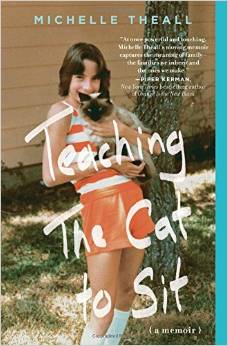Great title, right? It’s also literal. Poor Mittens. Michelle Theall’s memoir isn’t organized linearly, but intersperses chapters from childhood with chapters from adulthood. And as a child, she really did teach the family cat to sit. She writes poignantly of the deep loneliness that caused her to try to make the cat into something it was not, and manages somehow not to beat you over the head with maternal parallels.
Her establishing shot gives you this: a partner and a son, and iPhone contact with grandparents. Good! Also, the grandparents are due to arrive soon for the son’s baptism, which has been cancelled. Due to the priest’s sudden reconsideration of baptizing the child of gay parents. Also, the grandparents don’t know this. (Note: I use the word “gay” instead of “lesbian” because that’s what Theall uses, and she expresses dislike of the label “lesbian.”)
And then you get a snapshot of the beginning. Michelle was supposed to be Matthew; she notes that this was only the beginning of disappointing her parents. You see her as a young child in the Texas Bible Belt, learning that things she liked were inappropriate, and she herself, always, was inappropriate. Not concerned enough with femininity. Not modest. Always unacceptable and wrong. And then she was scarred by an experience that reinforced this self-perception. When she did finally begin to find herself, it was through sports, and her mother explained that not only do sports have no real value for girls in the real world, but that Theall’s ovaries would likely fall out (spoiler: they didn’t). And the rampant homophobia was so ingrained that homophobia wasn’t even a concept or a word. It was just life. Homosexuality was not a thing; it was wrong, it didn’t exist, it went against the natural order, it was against God.
Although I didn’t read this as a Christian memoir–but you could–Theall’s Catholicism, and her relationship with God, is one of the most important strands woven throughout the book. As she is fighting to have her son’s baptism rescheduled, Theall considers one of the focal points of the priest’s concern: “How do you reconcile your homosexual lifestyle with your Christian beliefs?” At that point, she thinks, she’s spent 42 years resolving that question. By then, her faith is a source of strength, not angst. (Faith. Not clergy. Faith.) Her tale of getting to that place of acceptance is powerful and filled with pain, uncertainty, lots of guilt, and some big epiphanic moments.
The religious aspect is tied in to a larger question of general identity. And this is all woven in with a third piece: Theall’s relationship with her (birth) family–particularly her mother. (In fact, separating these out makes for artificial distinctions, but is done for the sake of clarifying what you might want to keep an eye out for.) The reading group guide (included in the new paperback edition) says, “In order to be a good mother, Michelle begins to realize that she may have to be a bad daughter.” While reading this book, you will probably never be convinced that Theall feels she has any chance of being regarded as a good daughter. You will probably wonder if, now that this book has been published, Theall’s mother is still talking to her. You may cheer inwardly at the choice to publish, knowing full well what the consequences might be.



Baxter Clare says
Thank you for reviewing this lovely memoir. I was lucky enough to meet Ms. Theall at a writers workshop and she is a very warm, funny, and gutsy lady. I’m not a huge memoir fan but Teaching the Cat to Sit was so well written it’s become one of my favorites.